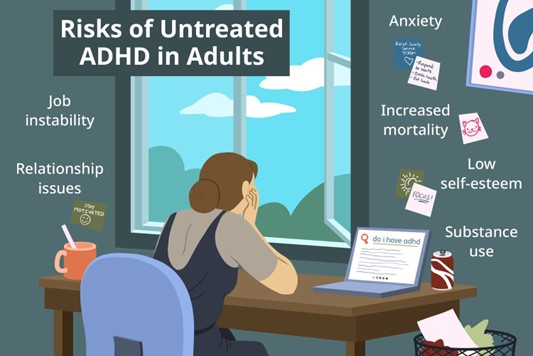It is typically analyzed in youth but can continue into maturity. There has been much discussion and analysis about the possible connections between ADHD and other mental diseases, with queries often occurring about whether mental illness forces ADHD or vice versa. This report seeks to delve into the connection between mental disease and ADHD, discussing the reasons, comorbidities, and therapy substances.
Learning ADHD
ADHD is one of the most familiar childhood conditions and can persist via adolescence and maturity. The immediate signs are:
Inattention: Test maintaining concentration, following through on jobs, and scheduling actions.
Hyperactivity: Extreme fidgeting, turmoil, and an incapacity to stay installed or reserved.
Impulsivity: Working without judging, interrupting others, and an inability to stay in one’s favor.
These signs can lead to substantial impairment in educational, social, and occupational functioning. ADHD is analyzed based on measures delineated in the Diagnostic and Statistical Manual of Mental Disorders (DSM-5), which contains a complete review of signs, time, and the effect on functioning.
The Reasons for ADHD
The exact cause of ADHD is not caught on, but it is considered to be the impact of a blend of hereditary, natural, and neurological perspectives.
Genetics: ADHD manages to run in households, offering a powerful hereditary element. Investigations have indicated that people with a first-degree family with ADHD are more likely to produce the disease.
Brain Format and Position: A study has shown that people with ADHD may have disparities in brain form and process, especially in regions linked to concentration, impulse management, and administrative processes.
Environmental Characteristics: Prenatal direction to poisons (such as alcohol and tobacco), low birth importance, and early disclosure have been associated with an improved risk of acquiring ADHD.
Psychosocial Aspects: While not a natural cause, stressful life events, family dysfunction, and traumatic incidents can worsen signs of ADHD.
Comorbidity of ADHD and Mental Illness
ADHD often co-occurs with other cognitive fitness needs, including stress conditions, despair, bipolar disease, and oppositional defiant disease (ODD). This comorbidity can confuse the clinical manifestation and therapy of ADHD.
Anxiety Diseases:
Many people with ADHD also share stress diseases. The carelessness and impulsivity related to ADHD can compound uneasiness signs, appearing moved forward-center and uneasiness.
Recess:
Kids and grown-ups with ADHD have a more heightened chance of creating despair. The challenges and dissatisfactions related to ADHD can contribute to estimations of loss of hope and moo self-esteem.
Bipolar Illness:
This can make it hard to differentiate between signs of the two diseases, especially during manic attacks.
Oppositional Defiant Disorder (ODD):
ODD, characterized by a way of furious, rebellious conduct, is typically seen in kids with ADHD. The impulsivity and hyperactivity of ADHD can show clashes with power formations and peers, donating to the story of ODD.
Does Mental Disease Push ADHD?
The connection between mental illness and ADHD is difficult and bidirectional. While the mental condition does not render ADHD per se, the company of other cognitive health needs can affect the expression and rigor of ADHD signs. Contrarily, the signs of ADHD can worsen or contribute to the growth of other mental health problems.
Transferred Genetic and Environmental Elements: Many cognitive diseases and ADHD share hereditary and environmental hazard characteristics. For instance, family records of cognitive illness can improve the chance of creating both ADHD and other psychiatric diseases.
Neurobiological Overlapping: There is considerable overlapping in the brain areas and neurotransmitter techniques interested in ADHD and other cognitive health needs. Dysregulation of dopamine and norepinephrine, for example, is involved in both ADHD and mood disturbances.
Effect on Acting: The practical impairments associated with ADHD, such as educational problems, social challenges, and lower self-esteem, can raise the risk of acquiring secondary mental health issues. The tension and frustration resulting from these challenges can contribute to stress, sadness, and other conditions.
Therapy Imports
Comprehending the connection between ADHD and comorbid cognitive conditions is essential for adequate therapy planning. An integrated system that handles both ADHD signs and co-occurring mental health disorders is often required.
Remedy: Stimulant drugs are commonly employed to deal with ADHD. Non-stimulant remedies may also be limited. When comorbid disorders are attending, other drugs may be required.
Psychotherapy: CBT is valuable in overseeing both ADHD and co-occurring stretch or pity. CBT permits individuals to create overseeing forms, improve administrative aptitudes, and address negative considering habits.
Behavioral Mediations: Behavioral medications, counting parent actions, and conducting alter plans, can be valuable for children with ADHD and ODD. These interventions concentrate on supporting praising manners and decreasing challenging ones.
Help and Instruction: Providing instruction and help to people with ADHD and their homes is important. Comprehending the disease and its effect can help reduce stigma, encourage practical coping techniques, and enhance the overall rate of life.
Conclusion
While mental condition does not now cause ADHD, the association between ADHD and other psychiatric disorders is complicated and multifaceted. The existence of comorbid mental fitness problems can impact the expression and rigor of ADHD signs, and vice versa. A complete system that manages both ADHD and co-occurring disorders is important for optimizing products and enhancing the lives of those impacted by this difficult disease. By improving understanding and awareness, we can better help people with ADHD and their homes, eventually enabling a more inclusive and understanding community.
